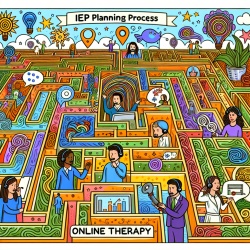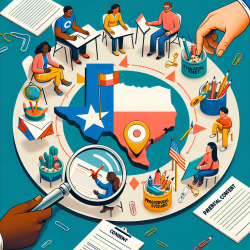Welcome to the IEP Labyrinth
Have you ever felt like navigating an IEP (Individualized Education Program) meeting is akin to solving a Rubik's cube blindfolded? You're not alone. As funding agencies, you hold the key to unlocking resources that can make these meetings less daunting and more productive. But fear not, because today we're diving into the world of IEPs with a sprinkle of humor and a dash of data-driven insights.
The IEP: More Than Just Acronyms
IEPs are like the Swiss Army knives of special education—multifaceted, essential, and sometimes a little tricky to handle. These plans are designed to cater to the unique needs of each student, ensuring they receive the support necessary to thrive in their educational journey. However, understanding how to effectively allocate resources, like speech therapy staffing and mental health services, can feel like finding a needle in a haystack.
Why Funding Agencies Matter
Funding agencies play a pivotal role in the IEP process. Your decisions can significantly impact the quality of services provided to students. Think of yourselves as the wizards behind the curtain, pulling the strings to ensure every child receives the tailored support they need. But with great power comes great responsibility, and making informed decisions is crucial.
Data-Driven Decisions: Your Magic Wand
In the realm of IEP planning, data is your best friend. It provides clarity and direction, helping you allocate resources effectively. Here are a few ways data can guide your decisions:
- Assessing Needs: Data helps identify the specific needs of each student, allowing for targeted interventions.
- Tracking Progress: Regular data collection enables monitoring of student progress, ensuring interventions are effective.
- Resource Allocation: By analyzing trends, you can allocate resources like speech therapy staffing where they're most needed.
Online Therapy: The Game Changer
Enter online therapy services, the superheroes of modern education. With the flexibility and accessibility they offer, online therapy is revolutionizing the way we approach special education. Here’s why it’s a game changer:
- Accessibility: Students can receive therapy from the comfort of their homes, breaking geographical barriers.
- Customization: Online platforms allow for personalized therapy sessions, catering to individual student needs.
- Efficiency: Streamlined processes and reduced wait times mean more students receive timely support.
Conclusion: The Power of Humor and Insight
While IEP meetings can sometimes feel overwhelming, a touch of humor and a commitment to data-driven decisions can make the process less daunting. By understanding the unique needs of each student and leveraging resources like online therapy, funding agencies can transform the educational landscape for children with special needs.
So, the next time you find yourself lost in the IEP labyrinth, remember that you're not alone. With the right tools and a bit of laughter, you can navigate the maze and create meaningful outcomes for the children you serve.










